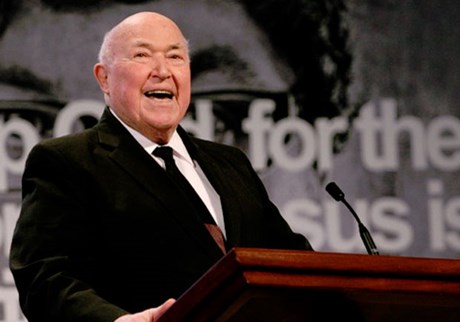Renowned California pastor founded Calvary Chapel movement.

Chuck Smith, the evangelical pastor whose outreach to hippies in the 1960s helped transform worship styles in American Christianity and fueled the rise of the Calvary Chapel movement, died Thursday, Oct. 3, 2013, after a battle with lung cancer. He was 86.
Diagnosed in 2011, Smith continued to preach and oversee administration at Calvary Chapel Costa Mesa (California), where he’d been pastor since 1965. In 2012, he established a 21-member leadership council to oversee the Calvary Church Association, a fellowship of some 1,600 like-minded congregations in the United States and abroad.
Smith was known for expository preaching as he worked his way through the entire Bible, unpacking texts from Genesis through Revelation and offering commentary along the way.
Yet it was his openness to new cultural styles, including laid-back music and funky fashions of California’s early surfer scene, that helped him reach young idealists and inspire a trend toward seeker-sensitive congregations.
“He led a movement that translated traditional conservative Bible-based Christianity to a large segment of the baby boom generation’s counterculture,” says Brad Christerson, a Biola University sociologist who studies charismatic churches in California. “His impact can be seen in every church service that has electric guitar-driven worship, hip casually-dressed pastors, and 40-minute sermons consisting of verse-by-verse Bible expositions peppered with pop-culture references and counterculture slang.”
Born to a Bible-quoting mother and a salesman father who became a zealous convert in midlife, Smith grew up in Southern California, where he witnessed to the Gospel from a young age.
After Bible college training and a stint as a traveling evangelist, he sought a niche in Pentecostalism by pastoring several Church of the Foursquare Gospel congregations. But he confesses in Chuck Smith: A Memoir of Grace: “I just never succeeded” in that denominational environment.
He found his groove in the 1960s, when many evangelicals were frowning on the wild outfits, long hair and psychedelic music that were all the rage among young adults. One seminal moment came during his early days at Calvary Chapel Costa Mesa, where old guard trustees posted a sign in their renovated sanctuary: “no bare feet allowed.” Smith tore it down with a promise to reach young souls for Christ, even it meant throwing out new pews and carpeting and bringing in steel folding chairs.
“Lifestyle issues and morality issues were things that he would expect Christ would clean up in these folks lives,” said Larry Eskridge, associate director of the Institute for the Study of American Evangelicals at Wheaton College. “But the informality of these folks and the music they were fond of – he was willing to let that slide quite a bit.”
Smith never became a hippie, Eskridge said. But he nonetheless won a following as a non-judgmental father figure by welcoming a blend of pop music, poetry and aspiration to live like Jesus. Together with hippie Lonnie Frisbee, Smith helped propel the Jesus People Movement, with its embrace of Christ’s teachings and disavowal of institutional church trappings.
Smith also pioneered translations of Gospel teachings into 20th-century pop art forms. In 1971, he launched Maranatha! Music, a pioneering record label designed to promote the “Jesus music” that his young followers were producing on the California coast.
